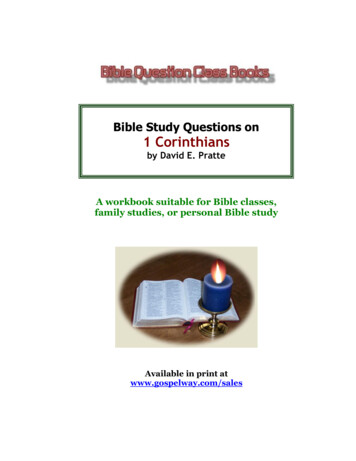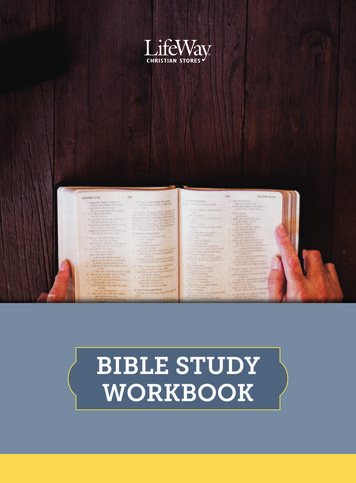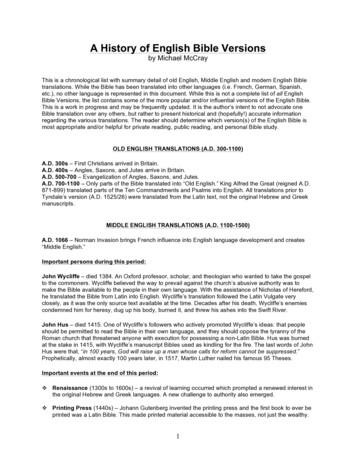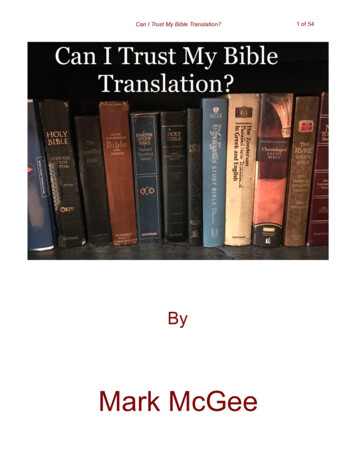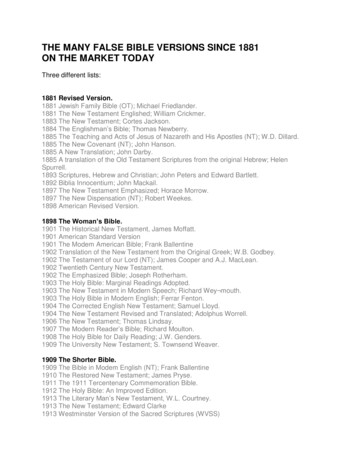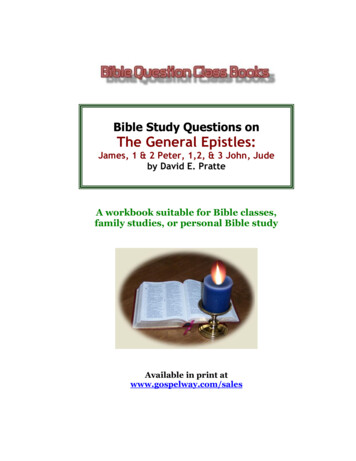
Transcription
Bible Study Questions onThe General Epistles:James, 1 & 2 Peter, 1,2, & 3 John, Judeby David E. PratteA workbook suitable for Bible classes,family studies, or personal Bible studyAvailable in print atwww.gospelway.com/sales
Bible Study Questions on the General Epistles:James, 1 & 2 Peter, 1,2, & 3 John, JudeA workbook suitable for Bible classes, family studies,or personal Bible study Copyright David E. Pratte, 2013, 2014All rights reservedISBN-13: 978-1497441309ISBN-10: 1497441307Printed books, booklets, and tracts available atwww.gospelway.com/salesFree Bible study articles online atwww.gospelway.comFree Bible courses online atwww.biblestudylessons.comFree class books atwww.biblestudylessons.com/classbooksFree commentaries on Bible books atwww.gospelway.com/commentaryContact the author atwww.gospelway.com/commentsNote carefully: No teaching in any of our materials is intended or should ever beconstrued to justify or to in any way incite or encourage personal vengeance orphysical violence against any person.“He who glories, let him glory in the Lord”– 1 Corinthians 1:31Front Page PhotoRuins of the synagogue in Capernaum(the home of Simon Peter was near the synagogue)“Now as soon as they had come out of the synagogue, they entered the house ofSimon and Andrew, with James and John. But Simon’s wife’s mother lay sick witha fever So [Jesus] came and took her by the hand and lifted her up, andimmediately the fever left her.” – Mark 1:29-31Photo credit: FreeStockPhotos.comScripture quotations are generally from the New King James Version (NKJV), copyright 1982,1988 by Thomas Nelson, Inc. used by permission. All rights reserved.Workbook on General EpistlesPage #2
Other Books by the AuthorTopical Bible StudiesGrowing a Godly Marriage & Raising Godly ChildrenWhy Believe in God, Jesus, and the Bible? (evidences)The God of the Bible (study of the Father, Son, and Holy Spirit)Grace, Faith, and Obedience: The Gospel or Calvinism?Kingdom of Christ: Future Millennium or Present Spiritual Reign?Do Not Sin Against the Child: Abortion, Unborn Life, & the BibleTrue Words of God: Bible Inspiration and PreservationCommentaries on Bible BooksGenesisJoshua and RuthJudges1 SamuelEzra, Nehemiah, and EstherJobProverbsGospel of MarkGospel of JohnActsRomansEphesiansPhilippians and ColossiansHebrews1 & 2 PeterBible Question Class BooksGenesisJoshua and RuthJudges1 SamuelEzra, Nehemiah, and EstherJobProverbsEcclesiastesIsaiahGospel of MatthewGospel of MarkGospel of LukeGospel of JohnActsRomans1 Corinthians2 Corinthians and GalatiansEphesians and PhilippiansColossians, 1&2 Thessalonians1 & 2 Timothy, Titus, PhilemonHebrewsGeneral Epistles (James - Jude)RevelationWorkbooks with Study NotesJesus Is Lord: Workbook on the Fundamentals of the Gospel of ChristFollowing Jesus: Workbook on DiscipleshipGod’s Eternal Purpose in Christ: Workbook on the Theme of the BibleVisit our website at www.gospelway.com/sales to see a current listof books in print.Page #3Workbook on General Epistles
Bible Study Questions on General Epistles:James, 1 & 2 Peter, 1,2, & 3 John, JudeIntroduction:This workbook was designed for Bible class study, family study, or personal study. The classbook is suitable for teens and up. The questions contain minimal human commentary, but insteadurge students to study to understand Scripture.Enough questions are included for teachers to assign as many questions as they want for eachstudy session. Studies may proceed at whatever speed and depth will best accomplish the needsof the students.Questions labeled "think" are intended to encourage students to apply what they have learned.When questions refer to a map, students should consult maps in a Bible dictionary or similarreference work or in the back of their Bibles. (Note: My abbreviation "b/c/v" means "book,chapter, and verse.")For class instruction, I urge teachers to assign the questions as homework so students cometo class prepared. Then let class time consist of discussion that focuses on the Scripturesthemselves. Let the teacher use other Scriptures, questions, applications, and comments topromote productive discussion, not just reading the questions to see whether they were answered“correctly.” Please, do not let the class period consist primarily of the following: "Joe, will youanswer number 1?” “Sue, what about number 2?" Etc.I also urge students to emphasize the Bible teaching. Please, do not become bogged downover "What did the author mean by question #5?" My meaning is relatively unimportant. The issueis what the Bible says. Concentrate on the meaning and applications of Scripture. If a questionhelps promote Bible understanding, stay with it. If it becomes unproductive, move on.The questions are not intended just to help students understand the Scriptures. They are alsodesigned to help students learn good principles of Bible study. Good Bible study requires definingthe meaning of keywords, studying parallel passages, explaining the meaning of the text clearly,making applications, and defending the truth as well as exposing religious error. I have includedquestions to encourage students to practice all these study principles.Note that some questions on this book are more difficult and advanced. The study leader maywant to skip some questions if he/she is teaching a less advanced study.Finally, I encourage plain applications of the principles studied. God's word is written so soulsmay please God and have eternal life. Please study it with the respect and devotion it deserves!For whatever good this material achieves, to God be the glory. David E. Pratte, June 21, 2017Workbooks, commentaries, and topical studies for sale in print atwww.gospelway.com/salesTo join our mailing list to be informed of new books or special sales, contact theauthor at www.gospelway.com/commentsWorkbook on General EpistlesPage #4
Assignments on James 1Please read the whole book of James at least once as we study chapter 1. Answer the followingquestions on chap. 1.1. Who is the author of this letter, and how does he describe himself – 1:1? (Think: What elsedo we know about this man?)2. To whom does he address his epistle?3. Define “temptation,” “divers,” and “patience” (KJV – 1:2,3). (Think: Contrast the attitudeexpressed by James to the way people generally view trials or temptations.)4. Explain how temptations can be good – 1:2-4. (Think: Should we deliberately allowourselves to be placed in tempting situations? Explain.)5. Define “wisdom,” and explain what the source of wisdom is – 1:5-8.6. Explain the connection between wisdom, prayer, and Bible study. (Think: How is a prayerfor wisdom answered? By direct revelation?)7. What is meant by praying “in faith,” and what happens when we pray doubting?8. List 3 other passages showing God answers prayer.9. Special Assignment: List other conditions we must meet in order for prayer to beanswered. (Think: Will God give us just anything we pray for? Are we praying “in doubt” if wethink He might not give what we ask for? Explain.)10. Define “double-minded,” and explain how God looks at such a man.Page #5Workbook on General Epistles
11. In what should the lowly brother and the rich brother glory – 1:9,10?12. Explain the illustration used in vv 10,11 showing that rich people will fade away. (Think:Why should a rich man glory in humility?)13. List two other passages showing life and/or riches are temporary.14. Tell what blessing is offered in 1:12 for enduring temptation, and explain what it means.15. Special Assignment: Explain the relationship between God and temptation – 1:13.(Think: What attitude does this mean we should have toward God when we are tempted?)16. Define “lust.” Describe the progression from temptation to death – 1:14,15. (Think:Explain the difference between temptation and sin. Can we sin without outward actions?)17. List two other passages about temptation.18. Describe some ways people may be deceived in these matters – 1:16.19. If God is not the source of temptation, what is He the source of – 1:17? (Think: In whatsense does God never vary, and why discuss this here?)20. Explain the connection between God’s word and the new birth – 1:18.21. Define “firstfruit.”Workbook on General EpistlesPage #6
22. List two other passages about the dangers of anger – 1:19,20. (Think: Does the Bibleteach anger is always sinful? Explain.)23. Application: Give examples of problems that anger can cause. (Think: Why is itimportant to be swift to hear and slow to speak?)24. What can God’s word do for us? How should we receive its benefits – 1:21?25. State the theme of 1:22-25.26. Explain the illustration of the mirror – 1:23,24.27. List 3 other passages about the importance of obedience. (Think: Explain theconsequences for the doctrine of salvation by “faith only.”)28. Define “religion,” and describe one way our religion may be vain – 1:26. (Think: How willa person speak if his tongue is “bridled”?)29. List two activities required by pure religion – 1:27.30. What does it mean to “visit” widows and orphans?31. Special Assignment: Is the context here referring to church work or individual work?Does this passage authorize church support of benevolent institutions?)32. What is the “world,” and how do we stay unspotted from it?Page #7Workbook on General Epistles
Assignments on James 2Please read the whole book of James again as we study chapter 2. Answer the followingquestions on chap. 2.1. Define “respect of persons” (KJV – 2:1-4), and list three other passages about it.2. Describe the specific example James gives for respect of persons.3. Application: List other examples in which people unfairly discriminate against others.4. Special Assignment: May we ever make distinctions between people? If so, on whatbasis (give b/c/v)? (Think: What applications should be made to homosexuals who want to betreated like a minority race? What about people who are poor because they are lazy?)5. What does James say is wrong about respect of persons in 2:4?6. Application: Describe other problems that can be caused in relationships between peopleif some show respect of persons.7. Contrast rich and poor people as described by James in 2:5-7. (Think: Are these things trueof all poor or rich people?)8. What is the royal law, and where else in Scripture is it recorded?9. Explain how respect of persons violates the royal law.10. What is the condition of people who practice respect of persons – 2:9?Workbook on General EpistlesPage #8
11. Explain the principle of law stated in 2:10-12.12. What illustration is used in 2:11 to demonstrate the principle? (Think: How does this applyto the discussion of respect of persons?)13. List two other passages that teach the importance of complete obedience. (Think: Whatlessons should we learn about justifying or continuing sin in our lives?)14. By what law will we be judged?15. Special Assignment: In what sense is this a law of “liberty”? Are we free to do as weplease? Explain.16. Define “mercy,” and explain how it relates to respect of persons. (Think: Connect“judging” in vv 4,12, & 13. Is all judging wrong? What is the point?)17. What new subject is introduced in 2:14-26, and how is the issue stated in 2:14?18. List other passages that discuss both faith and obedience (not necessarily using thosewords). (Think: What prominent doctrine says obedience is not necessary to salvation?)19. What example in 2:15,16 illustrates the issue?20. What does the illustration prove – 2:17? (Think: What good is “dead” faith? Can it save?)21. List several Bible examples of people who had a faith in God but were not saved.Page #9Workbook on General Epistles
22. According to 2:18, how are works and faith related? (Think: Is James saying people canbe saved without faith? Explain.)23. Who believes in God in 2:19, and what is the point?24. What conclusion is repeated in 2:20? (Think: Compare v20 to v14. In what sense is faithwithout works dead?)25. What Bible character is introduced in 2:21, and what did he do?26. List other Scriptures that discuss this event, then explain the meaning of 2:22.27. What passage is quoted in 2:23, and what does it say about Abraham? (Think: What ismeant by “reckon” — KJV?)28. Application: Explain the conclusion of 2:24, and explain the application to the doctrineof salvation by “faith only.”29. Describe another example of works, and what did she do – 2:25?30. How are faith and works illustrated in 2:26? (Think: What does this teach about physicallife and death?)31. Special Assignment: How do you harmonize the teaching of James 2 with suchpassages as Romans 4:1-5?Workbook on General EpistlesPage #10
Assignments on James 3Please read the whole book of James again as we study chapter 3. Answer the followingquestions on chap. 3.1. Why should not many be teachers – 3:1?2. List two other passages showing that all Christians need to be teachers. (Think: How doyou harmonize these verses with James 3:1?)3. Where else does the Bible teach that all people sin?4. How difficult is control of our tongue according to – 3:2?5. List other passages about evil speech and/or the importance of controlling speech.6. List three examples in James 3:3-5 that show something large and powerful can beinfluenced by something small.7. Explain how these examples listed above illustrate the tongue (speech).8. Application: List Bible examples in which speech led to severe consequences.9. Explain how the tongue can defile the whole body – 3:6.10. Explain the connection between the tongue and hell.Page #11Workbook on General Epistles
11. How is the tongue worse than animals – 3:7?12. Special Assignment: What does the Bible teach about man’s dominion over animals(give b/c/v)?13. How is the tongue described in 3:8? Explain the meaning.14. What example of speech problems is described in 3:9,10?15. Define “curse” and “bless.”16. List 3 other passages about cursing.17. What reason is given why cursing is wrong.18. Special Assignment: List other passages showing man is in God’s image, and explainwhat that means.19. What illustrations show the inconsistency of such cursing – 3:11,12?20. Application: What Bible principle is confirmed by the fact that a fig tree cannot yieldolives, and what is the application to evolution?Workbook on General EpistlesPage #12
21. How does a person act if he is truly wise – 3:13?22. Define “meekness,” and list two other passages where it is used. (Think: Does meeknessmean one is weak and never stands for anything? Explain.)23. Define “envy” and “strife” as used in 3:14,16 (KJV).24. List three other passages where one or both of these words are used. (Think: How dothese characteristics contrast to “meekness”?)25. What kind of “wisdom” promotes these attitudes, and how is this wisdom described?26. Describe the consequences these attitudes lead to 3:16, and explain how this can happen.27. Define these terms from 3:17 (KJV):pure —peaceable —gentle —easy to be entreated —Page #13Workbook on General Epistles
mercy —good fruits —partiality —hypocrisy —28. Special Assignment: Explain which characteristic of v17 must come “first,” and tellwhy this is so.29. Tell what fruit these righteous qualities will produce, and tell how this would happen.30. Summarize the two kinds of wisdom described in 3:13-18.Workbook on General EpistlesPage #14
Assignments on James 4Please read the whole book of James again as we study chapter 4. Answer the followingquestions on chap. 4.1. Define “wars,” “fightings,” “covet” – 4:1. (Think: What kind of conflicts are meant?)2. Tell what causes these conflicts, and explain how this happens – 4:1,2. (Think: In whatsense do pleasures “war in our members”?)3. Why do Christians sometimes not receive what they want – 4:3? (Think: What kind ofmurder or killing is referred to?)4. Application: What condition of prayer is listed here? Give examples of prayers thatdisplease God in this way.5. What sin is described in 4:4, and what consequence does it produce? (Think: How is theword “world” used here, and where else has James so used it?)6. Why does James call this “adultery”?7. Application: List other passages regarding the dangers of the “world,” and giveexamples of friendship of the world.8. 4:5 is difficult. Study cross-references and explain the verse in your own words.9. Define “grace” and “proud.”Page #15Workbook on General Epistles
10. What is God’s attitude toward pride and humility – 4:6? (Think: How does this relate to4:1-5?)11. How should we handle the devil and what will the result be – 4:7? (Think: Contrast this tovarious superstitious ways people think they can be protected from the devil.)12. Application: Give examples that illustrate how the devil should be treated.13. In contrast, how should we act toward God, and what will the result be – 4:8?14. What must we do to draw near to God? (Think: How does one cleanse or purify himselfbefore God?)15. For what should Christians weep and mourn – 4:9,10? (Think: How does this compare tothings people of the world typically laugh or cry about?)16. Define “humble,” and explain the results it produces.17. List two other passages about humility.18. To what topic does James return in 4:11, and what kind of sins are included in what hediscusses? (Think: In what sense does one “judge the law” if he commits these sins?)19. List passages about rebuking sin. (Think: Does James 4:11 forbid rebuking sin? Explain.)Workbook on General EpistlesPage #16
20. Who is the one lawgiver – 4:12? How do you know? (Think: How does this relate to v11?)21. What did James rebuke people for saying in 4:13? (Think: What kind of attitude does sucha statement express?)22. What reasons are given why this is a wrong attitude –4:14?23. List two other passages showing we do not know the future.24. Application: List two lessons we should learn from the fact we do not know the future.Does this mean it is wrong to make future plans? Explain.25. List two other passages showing the brevity of life.26. What should we say instead of bragging about the future – 4:15? (Think: Does this meanwe must always physically say these words?)27. Explain 4:16 in your own words.28. What sin is described in 4:17? (Think: Why is this warning important?)29. Application: Give examples of this sin.Page #17Workbook on General Epistles
Assignments on James 5Please read the whole book of James again as we study chapter 5. Answer the followingquestions on chap. 5.1. Who is spoken to, beginning in 5:1, and what are they told to do?2. List two other passages that warn of the danger of riches.3. Application: Why are riches a temptation? Are all rich people in sin? Explain.4. What problem do possessions have according to 5:2,3?5. List 2 other passages about the temporary nature of possessions.6. Application: Name 2 lessons we should learn from this.7. What specific sin of rich people is described in 5:4? (Think: Define “Sabaoth.”)8. Explain the illustration used in 5:5.9. What sin common to rich people is described in 5:6? (Think: Who is the just or righteousone referred to here? Explain.)10. Name other sins rich people often tend to commit.Workbook on General EpistlesPage #18
11. What subject is discussed in 5:7ff?12. Explain the illustration of the husbandman (5:7 — KJV). (Think: What is the “early andlatter rain”?)13. What does 5:8 teach about the coming of the Lord, and what does it mean? (Think: What“coming of the Lord” is referred to?)14. Describe the sin discussed in 5:9, and tell why it should be avoided. (Think: How does thisconnect to other parts of the book?)15. What example is upheld for us in 5:10?16. Who is specifically named, and what lesson should we learn from him – 5:11? (Think:Name some other men who also teach this lesson.)17. Special Assignment: Briefly tell the story of Job, and explain how he illustrates thelesson in context.18. Define “swear,” and list two other New Testament passages about it. (Think: Explainthe meaning of 5:12.)19. What should suffering people do, and how would it help – 5:13?20. What should cheerful people do, and why it is appropriate?Page #19Workbook on General Epistles
21. Special Assignment: Research and explain the Catholic doctrine of extreme unction.22. Case Study: Explain whether or not extreme unction fits 5:14,15 and other Bibleteaching.23. Read Mark 6:13 and Luke 10:34, then explain how anointing with oil is used there. (Think:What does v14 refer to, and what application should be made today?)24. List two other passages regarding confession of sins.25. Application: Explain some advantages of confessing sins to other Christians, and tellwhen we might need to do so – 5:16.26. Case Study: Explain whether this passage justifies the Catholic concept of confessing toa priest or praying to Mary.27. List two other passages about the power of prayer.28. Explain the example of answered prayer in 5:17,18, and tell where it is described in theOld Testament.29. What should we do for those in error – 5:19,20? List other passages on the subject.30. Explain why doing this is an act of love.Workbook on General EpistlesPage #20
Assignments on 1 Peter 1Please read the whole book of 1 Peter as we study chapter 1. Answer the following questionson chap. 1.1. Tell who wrote this book – 1:1,2, and list four facts you know about him.2. To whom was it written (locate on a map)? (Think: From where was it written, and whatdoes this mean? Compare 5:13.)3. Define: elect, foreknowledge, and sanctification.4. List other passages where one or more of these terms are used.5. Special Assignment: Is God’s election conditional or unconditional? Explain.6. Define “hope” and explain the sense in which we have a “living” hope – 1:3-5.7. Explain the connection between our hope and Jesus’ resurrection.8. Describe 3 characteristics of our inheritance.9. List two other passages about heaven as our reward.10. When will we ultimately receive salvation, and what does God’s power have to do with it?(Think: Does this mean we cannot be lost? Explain.)Page #21Workbook on General Epistles
11. In what should Christians rejoice – 1:6,7, and what may nevertheless cause grief? (Think:Is it wrong to grieve in trials? How long do they last?)12. Why can we rejoice in trials? Explain the illustration.13. Are our joy and love based on faith or sight – 1:8,9? Explain. (Think: How can you lovesomeone you have not seen?)14. Toward what ultimate goal does our faith lead, and what effect does this goal have on usnow?15. Who formerly wanted to understand God’s plan for man’s salvation, and what, inparticular, did they want to know 1:10-12?16. What had been predicted regarding Christ? (Think: Give some examples of thesepredictions.)17. Why was this information not given to these people, and to whom was it given? (Think:Did inspired men always understand their messages? What does this tell you?)18. Since the gospel is now ours, what attitude should we have – 1:13? (Think: Explain “girdup the loins of your mind.”)19. How should we not live – 1:14? Explain.20. Define “holy,” and explain how our place as children of God requires us to be holy – 1:1416. (Think: What Old Testament passages are quoted here?)Workbook on General EpistlesPage #22
21. How will God judge us, and how should that affect our lives – 1:17-19? (Think: What aremeant by “respect of person” and “fear” — KJV?)22. Define “redeem,” and explain from what we need to be redeemed.23. By what are we redeemed, and by what are we not redeemed?24. Special Assignment: Explain several similarities between Jesus and a lamb.25. List two other passages about redemption.26. In what sense was Jesus “foreordained” and then “manifested” (1:20,21 — KJV)? (Think:What is the consequence for the doctrine that Jesus’ death was unexpected by God?)27. How are souls purified, and what other passages teach similarly – 1:22?28. How should we love our brethren – 1:22, and where else does the gospel discuss brotherlylove?29. Explain the illustration of seed and the new birth – 1:23-25. (Think: What other passagesdiscuss the new birth?)30. How long will God’s word live, and how did Peter illustrate this? (Think: Why is thisimportant to our salvation?)Page #23Workbook on General Epistles
Assignments on 1 Peter 2Please read the whole book of 1 Peter again as we study chapter 2. Answer the followingquestions on chap. 2.1. Define these words from 2:1 (KJV): malice, guile, hypocrisies, envies, evil speakings.(Think: What applications should we make from these?)2. Explain the illustration of the baby and the milk – 2:2,3.3. Special Assignment: List two other passages showing Christians should grow, andexplain how a Christian’s life resembles a child growing.4. Who is the living stone of 2:4, and how does man’s view of Him differ from God’s?5. Who are the living stones of 2:5? What is the house they make up (see cross-references).6. What passage is quoted in 2:6, and in what sense is Jesus like a corner stone?7. Special Assignment: List the verses here that say Jesus is “precious,” and explain someways in which He is precious.8. What passage is quoted in 2:7, and where else is it quoted in the New Testament?9. Who were the builders, how did they reject Jesus, and how did He still become cornerstone?(Think: What does this show about God’s power?)10. In what sense is this cornerstone a stumbling block – 2:8? (Think: Is it always wrong tobe a stumbling block? Explain the contrast between cornerstone and stumbling block.)Workbook on General EpistlesPage #24
11. List and explain 5 terms for Christians in 2:9,10. (Think: In what sense are we a “peculiar”people — KJV?)12. State the purpose for which we were called, and explain some applications. (Think: In whatsense had we “not obtained mercy”?)13. From what should we abstain and why – 2:11? (Think: Where else are we called sojournersor pilgrims?)14. How should we act, and what reason is given – 2:12? (Think: What other passages teachsimilarly?)15. To whom should we submit according to – 2:13,14, and where else is this taught?16. What are the purposes of civil government?17. Application: List specific applications these verses have for citizens and for rulers.18. What purpose is served by well-doing (2:15)? (Think: Compare vv 11,12, and explain somespecific applications.)19. Explain how we are free, yet still bondservants – 2:16.20. List and explain 4 brief commands in 2:17.Page #25Workbook on General Epistles
21. What authority relationship is discussed in 2:18, and what is taught about it?22. Define “froward” (2:18 — KJV), and explain what applications we should make.23. What kind of suffering is pleasing to God, and what kind is not – 2:19,20?24. Application: Give examples that illustrate these kinds of suffering.25. What did Jesus leave us, and what should we do about it – 2:21,22?26. Why does Jesus deserve to be imitated, and what other passages teach this?27. How did Jesus act when suffering – 2:23? (Think: What lessons should we learn?)28. Explain the sacrifice Jesus made for us – 2:24.29. List other passages that teach as does v24.30. How are we like sheep, and how is Jesus like a shepherd – 2:25?Workbook on General EpistlesPage #26
Assignments on 1 Peter 3Please read the whole book of 1 Peter again as we study chapter 3. Answer the followingquestions on chap. 3.1. Who should be subject to whom in these verses – 3:1-6, and where else does the Bible soteach? (Think: What is the significance of “likewise” — KJV?)2. How should a woman deal with a husband who disobeys God? (Think: Does this justifydisobedience on her part? What lessons should wives learn?)3. Define “chaste” (3:2) and “meek” (3:4).4. List a similar passage to 3:3,4, and explain the meaning of these verses.5. Special Assignment: Are the item(s) in 3:3 absolutely forbidden? How do you know?(Hint: Study other “not but” passages. Do they always absolutely forbid the “not” item?)6. Describe and give examples of how a “meek and quiet” woman will and will not act.7. Who demonstrated the proper conduct of women, and how did she act – 3:5,6? (Think:Give some examples from her life that illustrate her conduct.)8. Application: Explain what it means for a husband to dwell with his wife according toknowledge – 3:7 (KJV). Give illustrations and applications.9. Define “honor.” How should a husband honor his wife? (Think: How is she a “weakervessel”?)Page #27Workbook on General Epistles
10. What does it mean for husband and wife to be “joint heirs”?) (Think: How might thesematters lead a man’s prayers to be hindered?)11. Define these terms in 3:8 (KJV): compassion, pitiful, courteous.12. What does 3:8 teach about our relations with our brethren? (Think: List some specificapplications.)13. How should we act when mistreated – 3:9? What other passages teach this?14. List 3 things we should do to “see good days” – 3:10,11, and tell what Old Testamentpassage is quoted here.15. List 2 other passages about the importance of proper speech.16. Application: Give examples of things we should and should not be willing to do toachieve peace. (Think: With whom should we seek peace?)17. List other passages that show whose prayer God will or will not hear.18. Explain 3:12 in your own words. (Think: What applications should be made?)19. What is the point of 3:13?20. If we do right and suffer, how should we respond – 3:14?Workbook on General EpistlesPage #28
21. What does it mean to sanctify Christ –3:15?22. When and how should we give answer to those who question us – 3:15? (Think: What ismeant by “answer” and “reason”?)23. What benefit will a good conscience accomplish – 3:16? (Think: Where else have westudied similar verses?)24. For what should we suffer, and for what should we not suffer – 3:17?25. How often, for whom, and for what reason did Jesus suffer – 3:18?26. Case Study: 3:19 has been used to teach that people can hear and obey the gospel afterdeath (spirits in prison). List passages that show we must obey God in this life, and our
Bible Study Questions on General Epistles: James, 1 & 2 Peter, 1,2, & 3 John, Jude Introduction: This workbook was designed for Bible class study, family study, or personal study. The class book is suitable for teens and up. The questions contain minimal human commentary, but instead urge st
